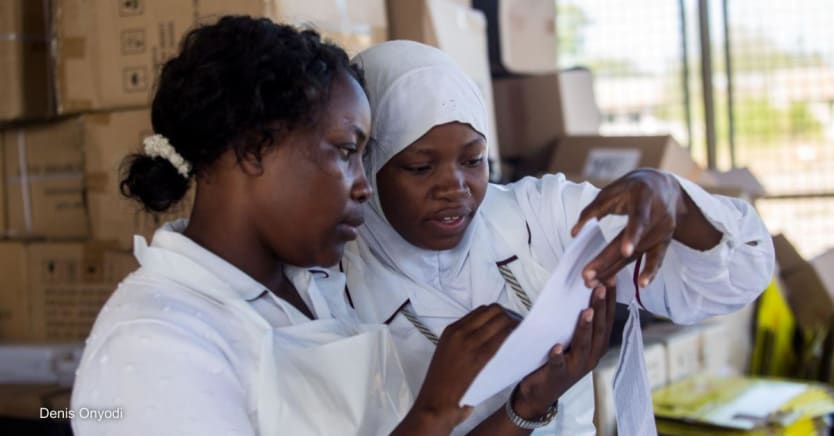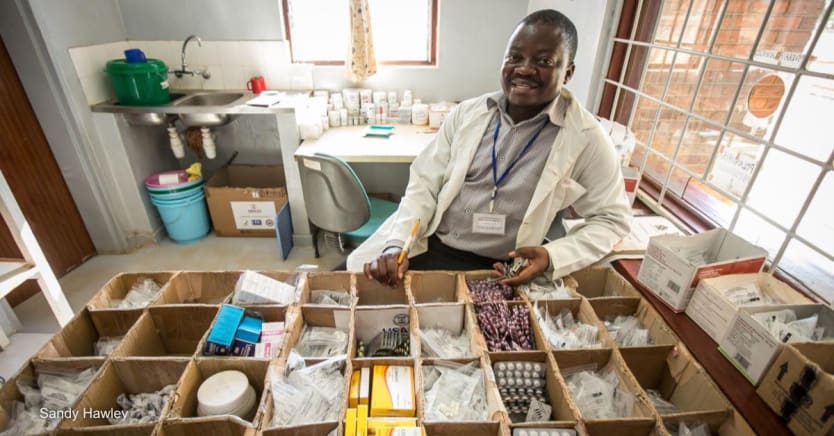Opinion: Why we need to professionalize the health supply chain workforce

After completing her bachelor’s degree in supply chain management, or SCM, Margaret Achieng was accepted onto an internship program as a procurement assistant in Kisumu, Kenya, to hone the practical supply chain skills she learned as part of her SCM degree. She has since found a permanent position in Nairobi, where she uses her skills to help people access the health commodities they need.
The opportunities Achieng has enjoyed are rare in low- and middle-income countries, where SCM is often an afterthought. Pharmacists and clinical staff are frequently required to perform supply chain functions despite lacking training, qualifications, or expertise. The cost of this skills gap can be catastrophic: if health supply chains are not able to deliver health commodities, patients don’t receive antiviral medication to keep HIV at bay, antibiotics to fight infection, or basic vaccines that keep children alive.
This skills gap is one of the reasons why more than half of the African population lacks access to essential medicines, but a professional supply chain workforce can help remedy this. Companies that invest more in the development of their supply chain employees improve their efficiency, reduce risks, and enhance the overall performance of their supply chain processes. However, in public health systems in LMICs, professionalization is not yet in full swing.
SCM professionalization — fast becoming countries’ number one priority
Hidden behind every successful health intervention is a functioning supply chain run by a competent, qualified, and skilled supply chain workforce — a workforce that is professionalized.
Professionalization is defined as the action or process of giving an occupation, activity, or group professional qualities, typically by increasing training or defining required qualifications. This process helps to ensure supply chain workforce job satisfaction and retention with clear opportunities for career advancement. The professionalization of SCM will increase the demand for supply chain roles in LMICs and create a market of individuals who seek supply chain qualifications.
For a country’s supply chain workforce to become professionalized a wide range of stakeholders must be involved. Public supply chain agencies, educational institutions, private sector companies, civil society, and others must all come together and jointly commit to the goal of professionalization.
People that Deliver’s, or PtD’s, SCM professionalisation framework is one tool that is used to bring all these stakeholders together. It aligns the private and public sectors with standard competencies, details the necessary supply chain roles and outputs that an organization needs, and defines career pathways adapted to suit local situations.
The framework has been central to professionalization progress in Nigeria. In 2023, the National Product Supply Chain Management Programme of Nigeria’s Federal Ministry of Health, with support from PtD and the Africa Resource Centre for Excellence in Supply Chain Management endorsed the SCM professionalization road map. In doing so, the government committed to the country-wide adoption of the SCM professionalization framework. Likewise in 2023, the U.S. Agency for International Development Global Health Supply Chain Program-Procurement and Supply Management project, in partnership with the Rwandan Ministry of Health, established the educational standards to develop the country’s health SCM curriculum and provide a ready-made market for the SCM workforce.
Preparing the next generation
Linking education to jobs is essential to reducing the global health workforce shortage, which stood at 15 million in 2020 — evidence that more needs to be done to maintain and grow a skilled and motivated workforce. Ensuring that prospective professionals are trained before they enter the health SCM workforce will reduce the need for what is often expensive in-service training. This requires the creation of pre-service training opportunities, such as university courses and professional certifications, as well as the inclusion of SCM modules in existing degree programs for health workers who often carry out SCM duties, such as pharmacists and nurses.
The SCM profession also needs to do more to attract youth to the profession. The whole community — educators and employers — needs to enhance the image of SCM so that it becomes an appealing and viable career choice for both youth and women. Internship programs, such as the one Achieng enjoyed in Kenya, could play a key role in helping qualified professionals make the leap from education to work.

PtD coalition member VillageReach focuses much of its attention on working with countries to bridge this education gap. In Mozambique, VillageReach is working with the education institute Instituto Superior de Ciências de Saúde to create the country’s first bachelor’s degree in health logistics, which will begin educating students in 2025. In Malawi, in partnership with the Malawi College of Health Sciences, VillageReach created the Pharmacy Assistant Training Program, which has successfully trained over 2,000 supply chain professionals since 2012. In the Democratic Republic of Congo, VillageReach worked with Institut Supérieur des Techniques Médicales to update the supply chain bachelor’s degree to incorporate key topics, including digital information systems and data-based decision-making.
PtD Global Indaba 2024
The PtD Global Indaba — a conference that focuses on human resources for health supply chain management — is an extension of the PtD coalition’s professionalization efforts. In March 2024 it will bring together all stakeholders in the health supply chain in Bangkok, Thailand, to present their solutions to catalyze health supply chain professionalization. The conference will also host the official launch of the PtD professionalization hub. We invite all stakeholders in Asia, Africa, and beyond to join us in Bangkok.
Register here.
What is needed to professionalize the supply chain workforce?
Commitment from all stakeholders around the shared vision of professionalization is needed to meet the Sustainable Development Goals and achieve universal health coverage.
Donor agencies should commit to systematic and coordinated multiyear investments to develop and strengthen the health supply chain workforce. They should work alongside educational institutions to increase access to pre-service educational programs, which will build a pool of qualified health supply chain professionals. At the same time, investments should contribute to the expansion of employment and career development opportunities, which include internship and apprenticeship programs, and mentorship opportunities for new entrants.
All these efforts will contribute to rejuvenating the perceptions of a career in health SCM.
Get in touch with PtD to learn about how you can help to professionalize the health supply chain workforce.
This opinion piece has been co-authored by:
Dominique Zwinkels, executive manager of PtD; Rebecca Alban, senior manager of Health Systems at VillageReach; Jonathan Moody, communications and advocacy officer for PtD; and Amanda Pain, senior manager of communications at VillageReach.
Search for articles
Most Read
- 1
- 2
- 3
- 4
- 5


